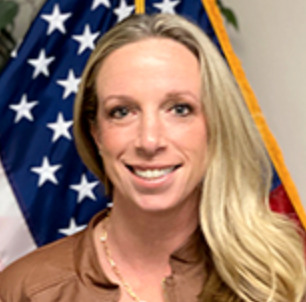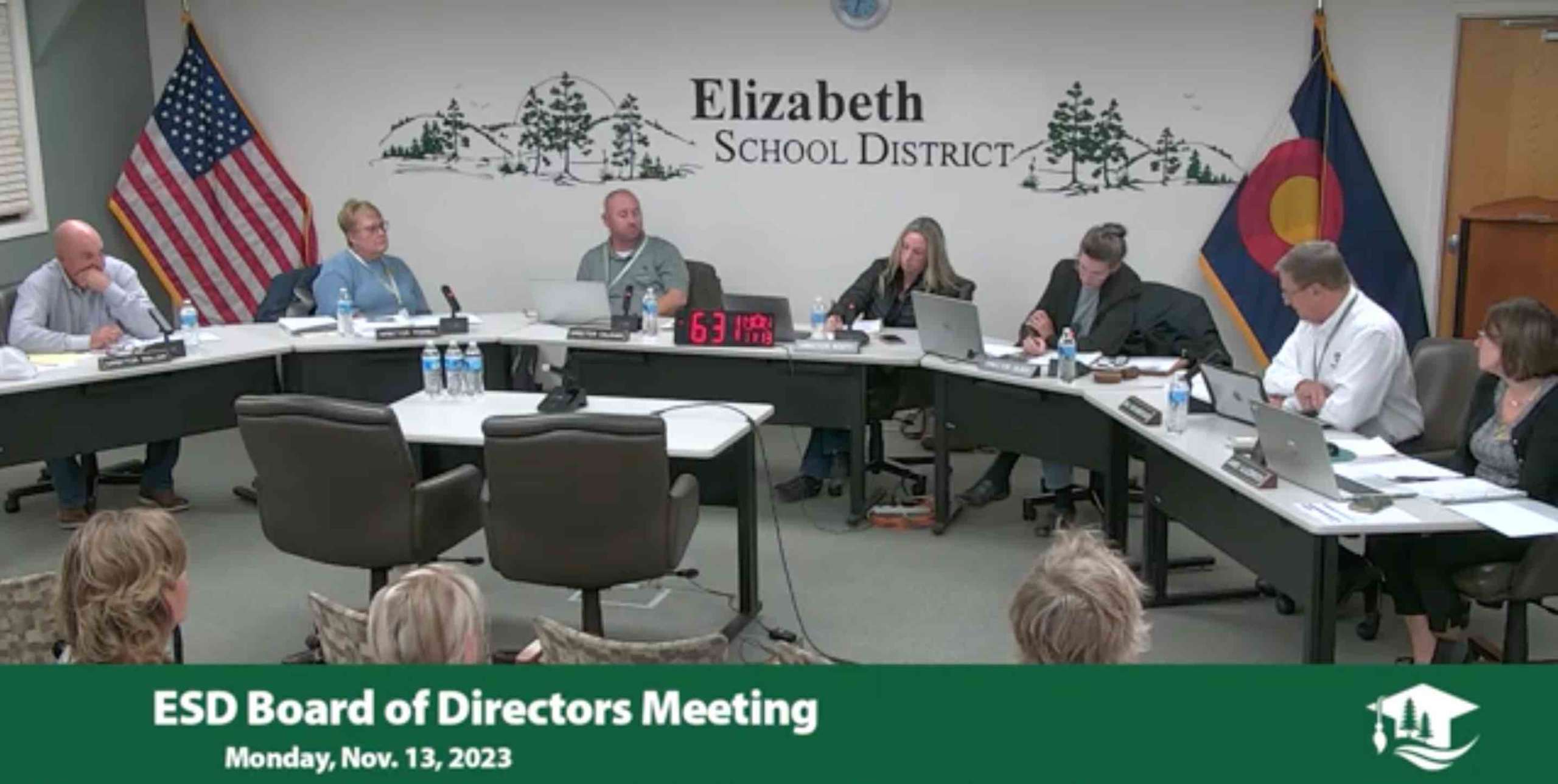Situated 45 miles southeast of Denver, Elizabeth School District has just 2,474 students, fewer than many high schools in Denver, Cherry Creek and Aurora. As a result, it’s easy to overlook the day-to-day workings of the small district in favor of the attention-grabbing antics of its larger neighbors.
However, the Elizabeth School District, which shares many similarities to Woodland Park, where the school board’s policy changes earned national news coverage and sparked multiple lawsuits, is primed to become the state’s latest example of far-right ideology taking over public education.
Several Colorado school districts have long had board members and administrators who subscribe to conservative ideologies. The difference is that since 2021, candidates backed by far right-wing organizations like Moms for Liberty, the Truth and Liberty Coalition, and the Colorado Conservative Patriot Alliance have become hyper-focused on issues around gender and race, what books students should be able to access, and whether diversity, inclusion and equity should be incorporated into public education.
The takeover is part of the Colorado GOP’s strategy to advance its agenda through school boards and city councils since Democrats control both houses of the legislature and the Governor’s office.
Earlier this month, Monument Academy school board president Ryan Graham told a group of citizens gathered at a luncheon sponsored by the Colorado Republican party, “At this point, we need school boards, and we need people to stand up while we still can and push back on this very destructive radical agenda that’s been saddled on the backs of our children.”
To effect the most change, Brad Miller, a conservative attorney whose law firm represents many charter schools and school boards across the state, including Elizabeth and Woodland Park, advised the same audience to “get a district leader who is aligned with you if you want to be effective.” Miller’s mother-in-law, Jane Lundeen, is a former principal of Monument Academy.
The directive is clear. Get elected to local office, hire administrators who align with your politics, and pass policies to keep concepts like CRT (critical race theory), SEL (social-emotional learning) and restorative justice out of your schools.
Out with the old


Neither the 2021 school board election in Elizabeth nor Woodland Park, which has 300 fewer students than Elizabeth, was particularly contentious. Woodland Park is located in deeply conservative Teller County. Elizabeth is also in a conservative pocket where three-quarters of Elbert County residents voted for Donald Trump in 2020.
Yet, in both cases, the incumbent board members found working with the newly elected members challenging. Their once-quiet board meetings started devolving into public attacks on teachers. And last-minute agenda items were added to the schedule with little to no public notice, violating Colorado’s open meeting laws.
Woodland Park’s one incumbent, Chris Austin, resigned in November 2022 after trying for a year to work with the new board. And in March 2023, Elizabeth’s three board incumbents, Cary Karcher, Kim Frumveller and Craig Blackham, resigned after growing tired of accusations that they were “caving to the pressure of local Democrats.”
Karcher accused the remaining board members, Rhonda Olsen and Heather Booth, of pursuing personal agendas, and Frumveller noted the board dynamics had worsened since the 2021 election. Blackham wrote in his resignation letter that the last nine months of serving on the board had been the worst experience he’d ever gone through.
Booth told Republican congressional candidate Deborah Flora on an episode of Flora’s former radio talk show that she and Olsen wanted to enact policies to prevent actions like the sexualization of children they’d seen happening in other districts from coming to Elizabeth. Flora lost her 2022 bid for the U.S. Senate after she failed to make the primary ballot and has built a reputation as a school parental rights advocate.
“We were just shocked at the pushback we got from the other members. It was absolutely incredible. And, you know, it was said that we were the ones bullying them and stuff like that, but they had a majority,” said Booth.
Since Karcher, Frumveller and Blackham resigned, Olsen and Booth temporarily appointed three board members aligned with their views who later won the election in November.
New Superintendents and legal counsel



In 2021, Woodland Park hired Ken Witt as superintendent and Miller as its attorney. The pair worked together in Jefferson County from 2013 to 2015, where their aggressive political agenda met with fierce teacher and community opposition, leading to Miller’s resignation and Witt’s recall from the school board.
Since taking the top job at Woodland Park schools, Witt has brought in the American Birthright curriculum standards, which the state board of education rejected as too extreme for Colorado, implemented a gag order on teachers and staff from speaking to the press, and allowed Merit Academy, a contract school to take space in Woodland Park Middle School. Contract schools aren’t subject to the statutory and regulatory provisions that cover charter schools.
Investigative columnist Logan Davis reported that Miller’s remarks during a July 2023 Freedom Foundation-sponsored event confirmed that “certain personnel decisions, like the hiring of superintendent Ken Witt, were part of a calculated political plan, and provided a great deal of insight into how the right-wing movement to seize control of public education is using local control to its benefit.”
Similar moves have taken place in Elizabeth since the beginning of the year. Just after the Elizabeth board members resigned, the district’s newly-appointed superintendent, Dan Snowberger, began his official duties. Within a month, Snowberger introduced Miller to the board, who then received approval to take over the district’s legal representation.
Snowberger, Witt and Miller worked together at Education ReEnvisioned BOCES. BOCES stands for Board of Cooperative (Educational) Services. The state Department of Education authorizes BOCES to supply educational services to two or more school districts that need help to afford the service.
Witt is the executive director, Miller is the legal counsel, and Snowberger served as the director of education operations until taking the superintendent role with Elizabeth. Merit Academy, the subject of much controversy in Woodland Park, is an Education ReEnvisioned school.
While Snowberger hasn’t enacted as many changes during his short tenure, he recently asked the board to approve an application to bring Career and College Prep Academy, an online multi-district school, to Elizabeth students. The academy would be a charter school managed by ACCEL Schools, a K-12 for-profit public charter school management organization (CMO).
According to a 2021 Network for Public Education report, ACCEL is the fourth largest and fastest-growing for-profit chain and “runs its supposedly non-profit schools with sweeps contracts.” The report found, after reviewing a contract for a school in Ohio, that it “not only details the sweeping services that ACCEL will provide but also makes it clear that the decision-maker will be the for-profit, not the board. ACCEL is the “exclusive custodian” of all revenues, choosing the bank into which the funds are deposited and managing the accounts. The 18 percent fee from revenue received ensures that ACCEL makes a profit.”
The Elizabeth school board supported the application without questioning Snowberger about what it would cost to bring the online school to the district, what curriculum the school uses or the school’s accreditations.
Snowberger has also begun using a substitute teacher hiring service called TAGG Education, owned by Miller’s son, Trevor. TAGG works like Uber in that it sends substitute requests to its contracted members, and the first to accept gets the job.

Districts then pay TAGG a transaction fee for teacher substitute placements TAGG makes and a “finders fee” if the district decides to hire a substitute it met through the platform. Miller has a financial interest in the company. In other districts that use Miller and TAGG’s services, like D49, which includes Falcon and part of Colorado Springs, Miller has signed a conflict of interest disclosure.
In response to whether Miller signed a similar contract with Elizabeth, Snowberger said, “I have been aware of the services TAGG has provided districts and charter schools and requested they submit a proposal to our district when I arrived.
“We’ve asked for no legal counsel representation on this decision. Therefore, Miller has had no connection to the decision-making or legal contract between TAGG and our district. Miller is not a decision maker in our district, therefore there is no need for a conflict of interest notice in our situation.”
Snowberger also confirmed that all of Elizabeth’s substitutes are now managed through TAGG. A public records request shows the district paid Tagg $10,000 in September of 2023.
Politics and Partisanship
While Booth told Flora that she’s “just not one for politics in the school” and that she’d prefer to get it out entirely, Booth and her fellow board members recently appeared in a campaign endorsement for Flora.
The ad states that the school board endorses Flora, which could violate the Fair Campaign Practices Act (FCPA). According to a 2020 memo from the Colorado Association of School Boards, “The FCPA prohibits political subdivisions of the state, such as a school district, from “mak[ing] any contribution in campaigns involving the nomination, retention, or election of any person to any public office” and from “expend[ing] any moneys from any source, or mak[ing] any contributions, to urge electors to vote in favor of or against “ballot questions or ballot issues.”
However, Olsen said that the board members endorsed Flora individually and not as a unit on behalf of the district. “I provided the quote, which did not reference the Elizabeth School District Board of Education or our titles.”
Individuals can endorse whoever they’d like for political office without violating FCPA. Still, a group of Elizabeth teachers questioned if the endorsement violates board policy.
An email obtained through a public records request sent from a teacher to Adam Payton, head of the district’s Teacher Advisory Committee stated:
“Upon careful review of the Elizabeth School Board policies, it has come to attention that these actions appear to be in direct violation of established ethical guidelines, as outlined in policy BCA-E-1. This policy explicitly states the imperative to “avoid being placed in a position of conflict of interest and refrain from using my board position for personal or partisan gain.” To provide clarity, the term “partisan gain” refers to the use of one’s official position to advance the interests of a particular political party, which goes against the principles of impartiality and fairness.
Furthermore, the endorsement seems to conflict with another board policy, BBA-R, which emphasizes the necessity for board members to “practice ethical behavior by observing appropriate limitations on their power and position.” The endorsement of a political party raises concerns about the board’s commitment to maintaining the ethical standards expected of its members.”
The email also expressed concern that the board’s endorsement may have violated Colorado’s open meeting laws since there was no public discussion or vote.
Olsen said, “The accusations of violating policy are unfounded and we are well within our right to endorse who we wish to as individuals.”
The other board members and Flora did not respond to a request for comment.
A teacher who spoke anonymously for fear of retribution said the board’s political endorsement of Flora felt hypocritical. “We’re told as educators and school staff members that you can’t bring your political views into the classroom or the school, so it (the endorsement) rubs people the wrong way.”
The teacher expressed concern that teachers might have to explain the political motivations of the school board to people outside of the district or to potential hires, which isn’t something she wants to do.
Culture shift
While there’s no evidence that teachers have been instructed not to communicate with the press like in Woodland Park, the teacher we spoke with said the culture in the district has changed.
“A lot of people don’t like to get tangled up in it because there seems to be backlash if we do. I’ve been in the district for several years, and this year has really been the first time that it kind of felt that way,” the teacher said.
“Let me be stressed about getting my grades done. Let me be stressed about making sure my kids are prepped for standardized testing. Let me stress about the things that I signed up to stress about. I did not sign up to stress if my board is toeing the line and representing my district that I love and I care about in a good way.”
Elizabeth isn’t the only school district with a conservative board, a like-minded superintendent, and a legal strategy to enact policies similar to those of Woodland Park. Still, Elizabeth school district parent Jessica Capsel said she’s seen greater community resistance in those places where parents and staff aren’t afraid to speak up.
“People in our community better wake up,” she said.
CORRECTION 12/18/23: An earlier version said Snowberger asked the board to approve an application for College Preparatory Academy, an Education ReEnvisioned BOCES. Snowberger instead asked the board to approve an application for Career and College Prep Academy, an online multi-district school managed by ACCEL Schools.




